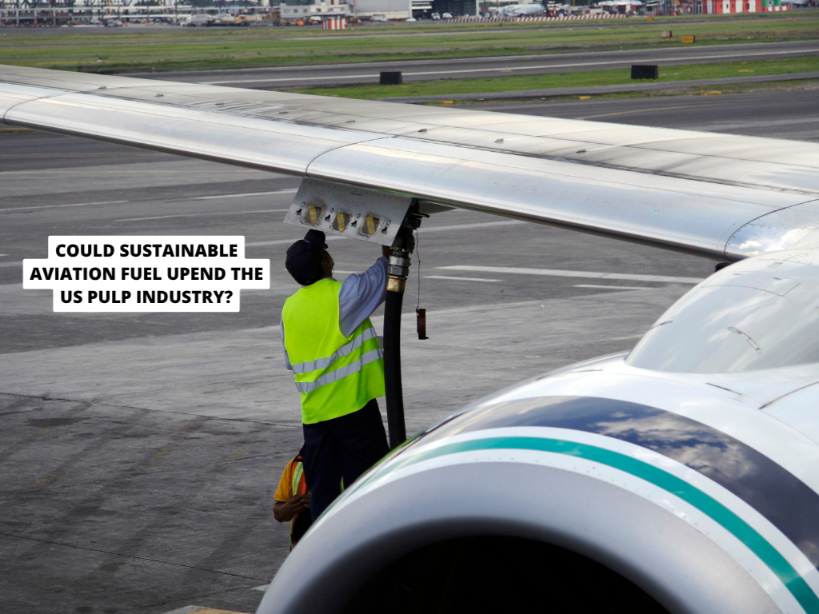Could Sustainable Aviation Fuel Upend the US Pulp Industry?
This content is being republished with the consent of Fisher International and ResourceWise. Read more about Sustainable Aviation Fuel at ResourceWise.
Sustainable Aviation Fuel (SAF) has buzzed the whole Biofuel and bio-industry due to its revolutionary fuel sustainability mechanism. SAF is an over-the-top aviation fuel that can be produced from various sustainable resources, including 100% renewable waste, raw materials, agricultural waste, used cooking oil, green hydrogen, and carbon extracted from the air.
Sustainable Aviation Fuel has chemical properties similar to conventional jet fuel. It has a chemistry compatible with the present jet engines. Thus, it can be utilized as a replacement for jet fuels.
As per the latest research and analysis, SAF has reduced greenhouse gas (GHG) emissions by an astonishing 80% compared to fossil jet fuels.
Major Advantages of SAF
The latest reports from the International Energy Agency have shown that aviation is responsible for emitting 2% of global carbon dioxide (CO2), which ultimately harms the environment. On the other hand, SAF usage is expected to lower carbon emissions, reducing greenhouse gas discharge.
Since 2017, almost 400,000 commercial flights have started using SAF, and the numbers are increasing exponentially. Over the last few years, SAF has helped to counter climate change by preventing fossil fuel emissions from entering the atmosphere.
Amongst the many advantages of SAF usage, it is pertinent to mention that Sustainable Aviation Fuel has improved and enhanced aircraft and jet’s overall performance. As per published reports, SAF has reduced carbon emissions by a staggering rate of 75% and a depletion of 90% in particulate creation, making it a cleaner burning fuel.
Increase in Demand for SAF Usage
Governmental organizations and firms are striving to develop plans and strategies to make SAF economically viable. The latest reports have suggested that the International Air Transport Association (IATA) aims to reach a zero carbon emission plan by 2050.
Some top airlines worldwide have decided to utilize SAF as the premium and only source for jet engine fuels. As per the latest surveys, the United States has reported an exponential increase in its SAF production. The production in the US has increased from 5 million gallons in 2021 to 13 million gallons in 2022.
The numbers signifying the rapid rise in SAF production are astonishing. Several renowned companies have set realistic targets and milestones to reach a million tons in the production of Sustainable Aviation Fuel. On the other hand, global production of SAF has reached 80 million gallons, and the numbers are expected to grow exponentially.

SAF impact on the US Pulp Industry
The sudden and massive increase in the demand for SAF has put several production companies on notice as they have started to find the best and sufficient quantities of feedstocks.
The present methodologies emphasized crops, oils, and waste. However, companies are already considering scaling up their production by using masses of wood, residues of forests, and other feedstock as the main source to produce SAF.
SAF’s rapid growth will likely affect the pricing and availability of biomass in the P & P Industry. This has raised some burning questions about paper and pulp manufacturing.
Sustainable Aviation Fuels growth has affected raw materials availability for pulp producers. The pricing of raw materials has also become a concern for the producers. Questions are being raised about a new market that will take center stage for selling wooden by-products.
Considering the amount of money poured into renewable fuel, a general survey indicates that SAF’s growth would ultimately harm the paper and pulp industry.
Conclusion
SAF has truly revolutionized the Jet Fuel industry. The number of advantages it offers has motivated several aviation companies to use it as the primary source of jet fuel. SAF is considered eco-friendly as compared to normal jet fuels.
Thus several airlines are influenced to incorporate and fuel their jet airplanes with SAF. The number of harmful gasses emitted from normal jet fuels destroys the environment. Hence SAF is considered valuable as it reduces greenhouse gas emissions to a considerable level.
Economically, Sustainable Aviation Fuel may seem on the higher side than normal jet fuels, but its advantages make it worth the price. It not only comes up as a clean fuel, but it is known to increase and enhance the performance of jet airplanes.


